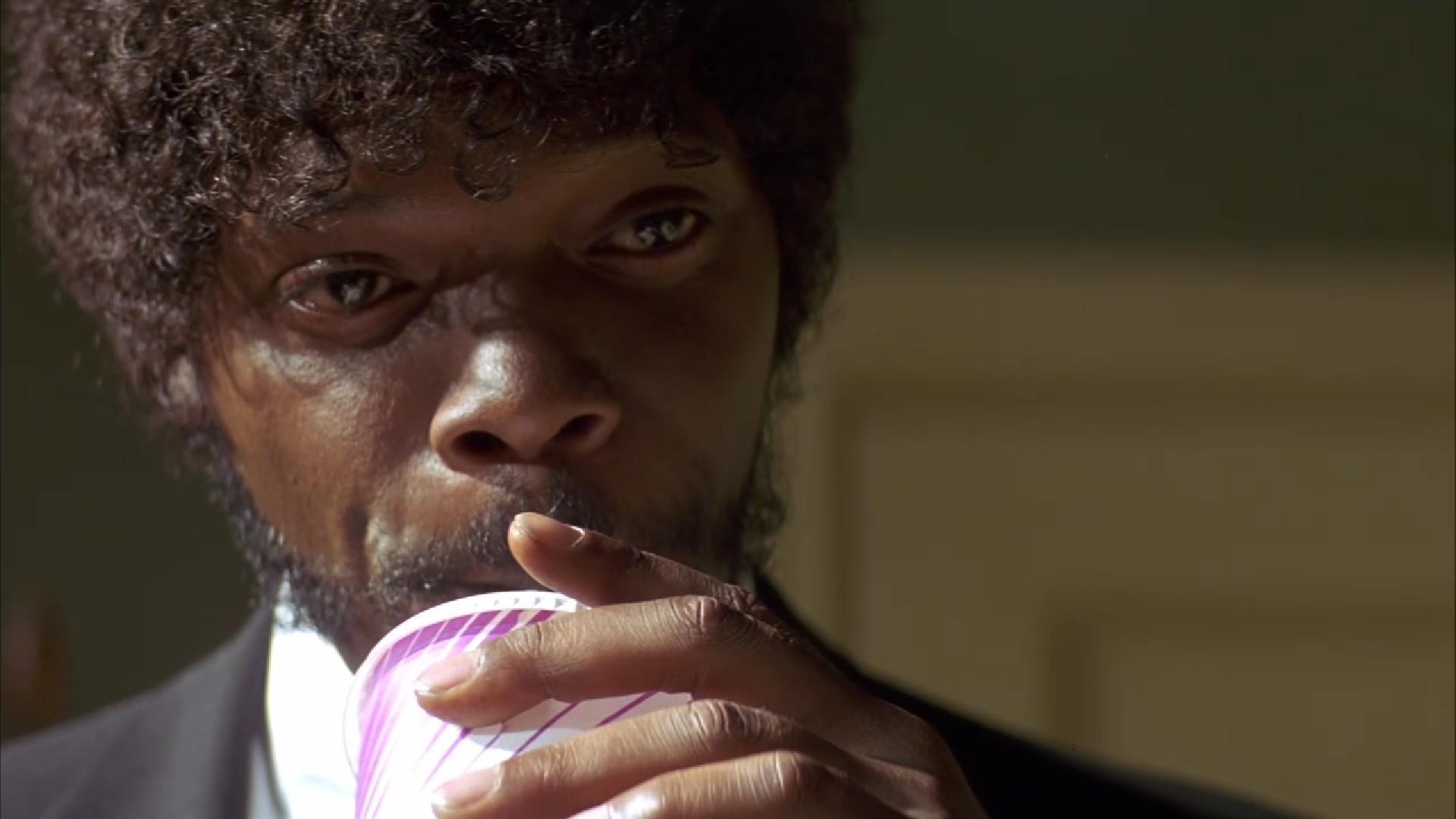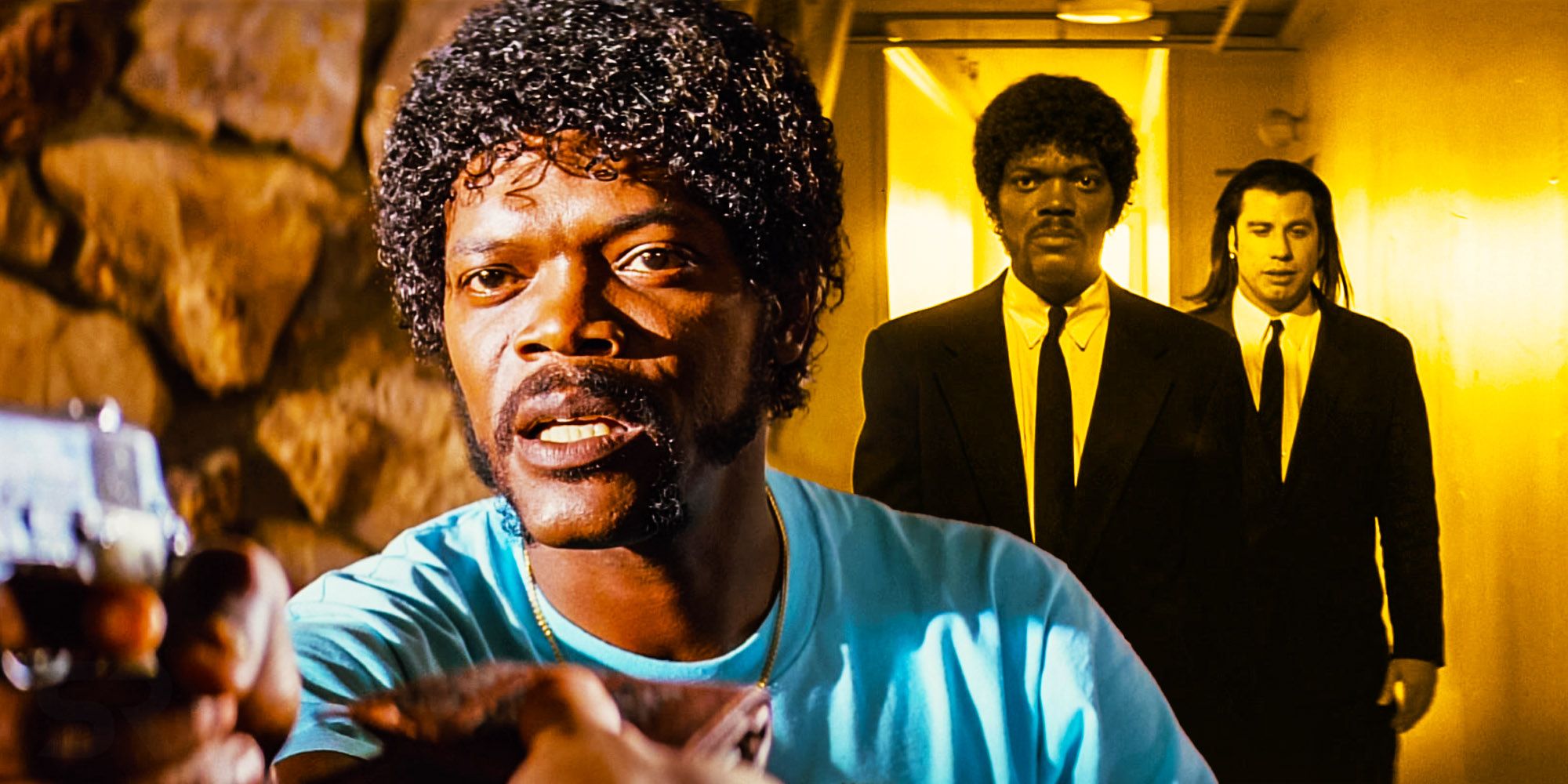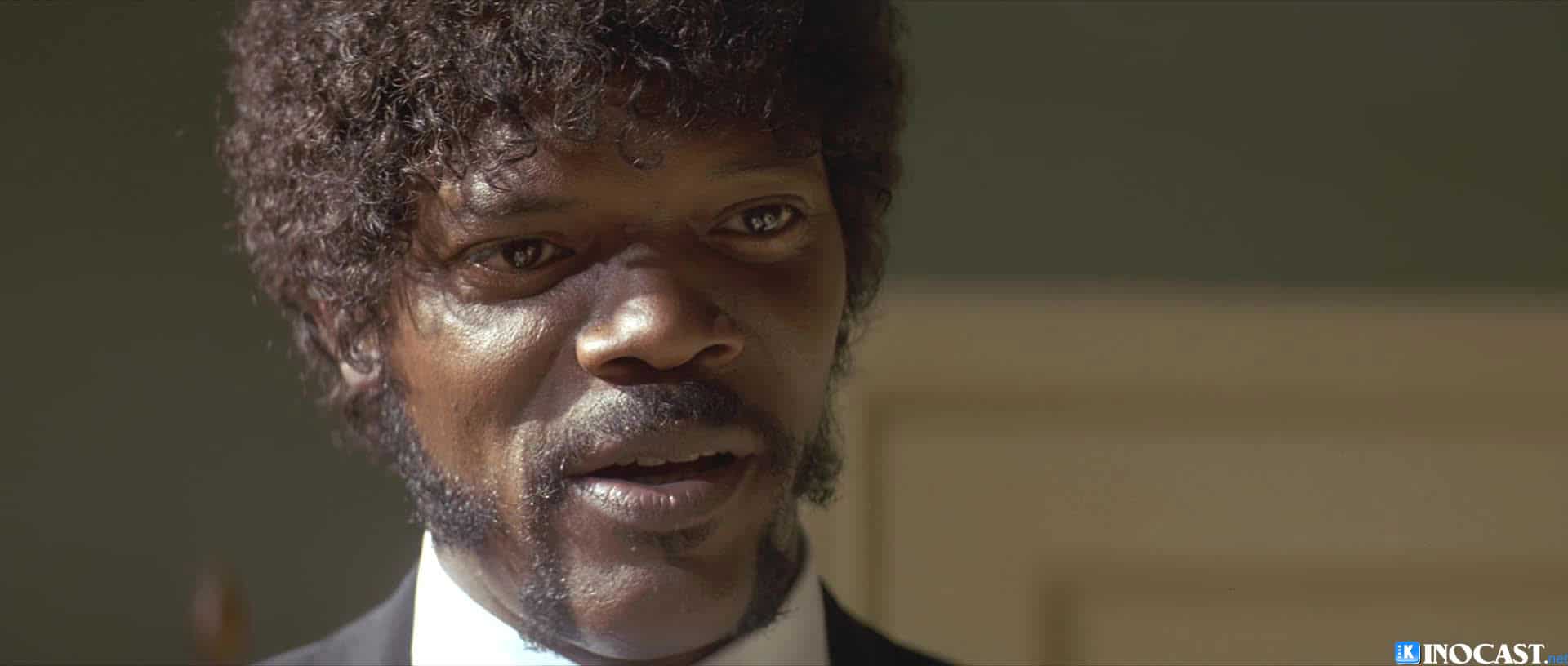Samuel L. Jackson In Pulp Fiction: Why Jules Winnfield Still Resonates Today
The film Pulp Fiction burst onto the scene in 1994, forever changing how we look at cinema, and, well, how we talk about burgers. Yet, arguably, one of its most enduring legacies is the unforgettable performance by Samuel L. Jackson as Jules Winnfield. This character, a hitman with a penchant for philosophical musings and a very distinct bible verse, truly cemented Jackson's status as a screen legend. His portrayal is a masterclass in acting, blending menace with unexpected depth, making Jules a figure audiences simply cannot forget, even after all these years.
When we think about iconic movie roles, Jules Winnfield often comes to mind, and it's almost entirely because of Samuel L. Jackson's incredible presence. He brought a unique blend of cool, intelligent, and utterly terrifying qualities to the character. It was a role that, in a way, allowed Jackson to showcase a range that few actors could match, proving his ability to command the screen with just a look or a perfectly delivered line.
This particular performance, you know, really highlighted Jackson's unique acting style, which combines intense charisma with a certain raw power. It's a portrayal that still draws people in, prompting discussions about its impact on film and pop culture, and it's a big reason why the film itself remains so beloved. So, let's take a closer look at what made this role so special.
- Morgan Freeman Unforgiven
- Patrick Stewart Oblivion
- Woody Harrelson Jason Sudeikis Movie
- Robert Downey Jr House Architectural Digest
- Chris Hemsworth And Liam Hemsworth
Table of Contents
- Samuel L. Jackson: A Brief Overview
- The Birth of Jules Winnfield
- The Performance That Defined a Career
- Jules Winnfield and His Impact
- Why Jules Still Matters Today
- Frequently Asked Questions About Jules Winnfield
Samuel L. Jackson: A Brief Overview
Samuel L. Jackson, born in Washington, D.C., and raised in Chattanooga, Tennessee, is an actor whose career spans decades and includes over 150 films. He graduated from Morehouse College in 1972, initially studying marine biology before shifting to drama. His early career saw him involved in theater and smaller film roles, gradually building a reputation for his powerful presence and distinct voice. It was his collaboration with Spike Lee in films like *Jungle Fever* that really brought him wider attention, setting the stage for his breakout in *Pulp Fiction*.
He's known for his roles in blockbusters and independent films alike, often playing strong, authoritative, or very charismatic figures. His work has earned him numerous accolades, and he's one of the highest-grossing actors of all time. His ability to deliver memorable lines, and his unique way of inhabiting each character, has made him a favorite among audiences and filmmakers, that's for sure.
Personal Details and Bio Data
| Category | Details |
|---|---|
| Full Name | Samuel Leroy Jackson |
| Date of Birth | December 21, 1948 |
| Place of Birth | Washington, D.C., U.S. |
| Nationality | American |
| Occupation | Actor, Producer |
| Years Active | 1972–present |
| Spouse | LaTanya Richardson Jackson |
| Children | 1 |
The Birth of Jules Winnfield
The character of Jules Winnfield, as imagined by Quentin Tarantino, was always meant to be a pivotal part of *Pulp Fiction*. Tarantino apparently wrote the role specifically with Samuel L. Jackson in mind, a decision that, you know, proved to be incredibly astute. The script gave Jackson a rich canvas to work with, allowing him to explore a character who starts as a ruthless hitman but experiences a profound, very personal transformation throughout the film.
- Mark Ruffalo As Hulk
- Patrick Stewart Ian Mckellen Waiting For Godot
- Woody Harrelson Gin
- Brad Pitt Once Upon A Time In Hollywood Sequel
- Idris Elba Movies
This character wasn't just another tough guy; he was a man grappling with morality, fate, and his place in the world. It's a compelling arc that, frankly, few characters in crime films get to experience. Jackson's performance brings out every nuance, making Jules feel incredibly real and complex.
Character Design and Development
Jules Winnfield's development from script to screen was a collaborative process, very much shaped by Jackson's input and interpretation. The character's journey from a cold-blooded enforcer to someone seeking a different path is, in a way, the moral compass of the film. He starts out quoting scripture before killing people, which is already pretty unique, and then he begins to actually internalize the meaning of those words, leading him to question his violent life.
This shift is not sudden; it unfolds subtly through his interactions and internal monologues. Jackson portrays this evolution with remarkable skill, showing the cracks in Jules's tough exterior and the genuine contemplation beneath. It's a performance that truly grounds the film's more outlandish moments, making the audience connect with Jules's very human struggle.
The Iconic Look
Jules's appearance is, too, quite distinctive and immediately recognizable. His neatly groomed afro, the sharp suit, and that piercing gaze all contribute to his memorable persona. This look, you know, perfectly complements his articulate yet dangerous demeanor. It’s a visual shorthand for his character: professional, precise, and capable of extreme violence.
The visual elements, combined with Jackson's physical presence, create a character that feels both larger than life and eerily grounded. It's a look that has been imitated countless times, a testament to its lasting impact on popular culture. You can instantly tell it's Jules, just from a silhouette, which is pretty cool.
The Performance That Defined a Career
Samuel L. Jackson's portrayal of Jules Winnfield is often cited as one of the best performances of his career, and it's easy to see why. He brings a raw energy and an undeniable charisma to the role that makes every scene he's in absolutely captivating. His ability to switch from calm contemplation to explosive rage in an instant is, honestly, breathtaking to watch.
This role truly showcased Jackson's range and cemented his place as a leading man. It was a moment where his talent truly shone, proving he could carry a film with his presence alone. The performance earned him an Academy Award nomination, which was, quite frankly, very well deserved.
Dialogue Delivery and Rhythm
One of the most striking aspects of Jackson's performance is his mastery of Tarantino's dialogue. The lines in *Pulp Fiction* are, you know, famously stylized and often quite lengthy, but Jackson delivers them with a natural rhythm and conviction that makes them sound incredibly authentic. He understands the cadence, the pauses, and the emphasis needed to make each word land with maximum impact.
Whether he's discussing the divine intervention of a missed shot or debating the merits of a foot massage, his delivery is consistently engaging. It’s not just about saying the words; it’s about inhabiting them, giving them weight and meaning. This skill is, arguably, a hallmark of his acting style, and it's on full display as Jules.
Emotional Range and Subtlety
Beyond the cool exterior and sharp dialogue, Jackson injects Jules with a surprising amount of emotional depth. We see moments of genuine fear, confusion, and ultimately, a profound sense of spiritual awakening. His expressions, the slight shifts in his voice, and his body language all convey an inner turmoil that goes beyond the surface-level hitman persona.
For example, the scene where he decides to "walk the earth" is a moment of quiet revelation, portrayed with a subtle earnestness that makes it truly believable. This ability to convey complex emotions without resorting to over-the-top dramatics is a testament to Jackson's skill as an actor. He makes Jules a character you can, like, really empathize with, even given his profession.
Jules Winnfield and His Impact
Jules Winnfield is more than just a character; he's a cultural icon. His lines are quoted, his image is recognized, and his journey is often discussed in film studies and casual conversations alike. The impact of Samuel L. Jackson's portrayal is, frankly, immense, shaping not only his career but also influencing how audiences perceive certain types of characters in cinema.
His performance helped solidify *Pulp Fiction* as a cinematic landmark, and it's hard to imagine the film without him. He brings a certain gravitas and a very unique energy that makes the movie, in some respects, truly special. This role, you know, is a big part of why the film has such lasting appeal.
The Ezekiel 25:17 Speech
Perhaps the most famous moment of Jules's performance is his recitation of Ezekiel 25:17. This speech, which he delivers with chilling intensity before executing his victims, becomes a central motif in his character's transformation. It starts as a ritualistic intimidation tactic, a way to justify his violence, but by the end of the film, it takes on a completely new meaning for him.
Jackson's delivery of this monologue is legendary. He builds the tension, plays with the rhythm, and infuses every word with a mix of menace and theatricality. It's a moment that captures the essence of his character and the film's unique blend of dark humor and profound reflection. People still quote it, you know, all the time, which is pretty wild.
Cultural Legacy and Quotability
Jules Winnfield's lines have become deeply ingrained in popular culture. Phrases like "Say 'what' again. Say 'what' again, I dare ya, I double dare ya motherf*****, say what one more goddamn time" or "I'm a mushroom cloud-laying motherf*****" are instantly recognizable. This quotability is, like, a huge part of the character's lasting appeal.
The character's impact extends beyond just memorable lines; he represents a new kind of anti-hero, one who is both terrifying and oddly charismatic, with a moral awakening that adds unexpected depth. His influence can be seen in countless characters that came after him, a testament to the power of Jackson's portrayal. It's a performance that, quite honestly, changed the game for many actors.
Why Jules Still Matters Today
Even decades after its release, *Pulp Fiction* and Samuel L. Jackson's portrayal of Jules Winnfield continue to captivate audiences. The character's journey from violence to a search for spiritual redemption resonates with people on a very personal level. His philosophical musings, his raw honesty, and his ultimate decision to change his life offer a compelling narrative that goes beyond typical crime film tropes.
Jules is, in a way, a timeless character because he grapples with universal themes of morality, fate, and personal responsibility. His transformation feels earned and genuine, making him a figure that audiences can connect with, even if his profession is, you know, rather unusual. The film's enduring popularity, and Jules's place within it, speaks volumes about the power of great acting and storytelling.
His performance also serves as a reminder of Samuel L. Jackson's incredible talent and versatility. He took a complex character and made him iconic, leaving an indelible mark on cinematic history. To truly appreciate the depth of this role, one might consider exploring more about the film's production and its lasting impact on cinema. You can learn more about Quentin Tarantino's directorial style on our site, and perhaps link to this page for more film analysis.
Frequently Asked Questions About Jules Winnfield
What is Jules Winnfield's most famous line in Pulp Fiction?
Jules Winnfield is perhaps most famous for his intense recitation of Ezekiel 25:17, which he delivers right before taking out his targets. He also has other highly quoted lines, such as his dialogue about the "miracle" and his very memorable exchange about a "Royale with Cheese."
Did Samuel L. Jackson win an Oscar for Pulp Fiction?
Samuel L. Jackson received an Academy Award nomination for Best Supporting Actor for his role as Jules Winnfield in *Pulp Fiction*. While he did not win the award that year, his performance is widely regarded as one of the most impactful and iconic in modern cinema, and it certainly elevated his career.
What is the significance of Jules's transformation in the film?
Jules's transformation is, like, a central theme in *Pulp Fiction*, representing a search for redemption and a questioning of one's violent path. After surviving a seemingly miraculous event, he decides to abandon his life as a hitman and "walk the earth," seeking a different, more righteous existence. This shift provides a moral anchor to the film's otherwise chaotic narrative, showing a character's genuine spiritual awakening.
- Tom Hardy Height
- Mark Ruffalo As Hulk
- Cillian Murphy On Netflix
- Brad Pitt On Jimmy Kimmel
- Brad Pitt Ex

Pulp fiction samuel l jackson soda wallpaper | (142144)

Samuel L. Jackson's Audition Issues Inspired An Iconic Pulp Fiction Scene

By Samuel L Jackson Pulp Fiction Quotes. QuotesGram